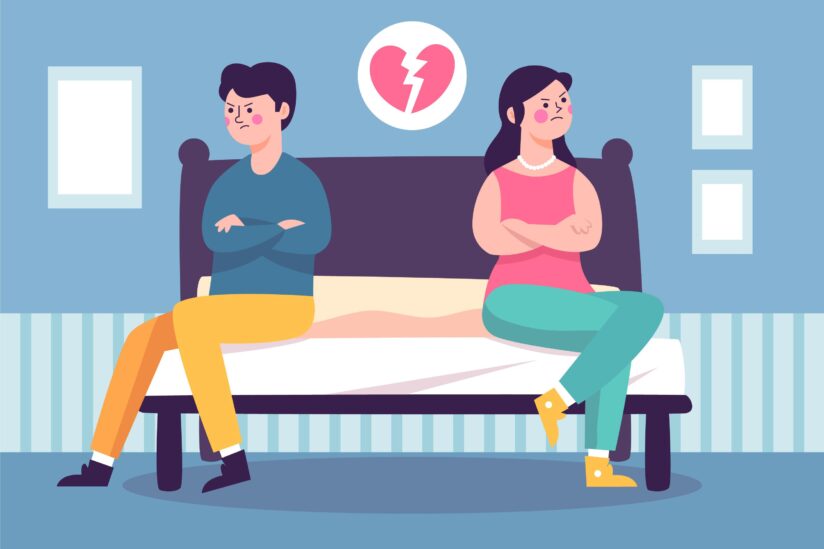Introduction-How to deal with Breakup: Tips for Recovery
Breaking up from a long and serious relationship can feel like the end of the world. It’s an emotional rollercoaster that shakes the very foundation of your being. But while the pain is inevitable, how you deal with it can make all the difference in your journey toward healing and recovery. Let’s dive into some effective coping mechanisms that can help you navigate through this challenging time.

Table of Contents
1.Understanding the Impact of a Breakup
Emotional Consequences
The emotional aftermath of a breakup can be overwhelming. Feelings of sadness, anger, confusion, and even relief are all part of the process. It’s crucial to acknowledge these emotions rather than suppress them. Cry when you need to, scream into a pillow, or simply sit in silence and let the tears flow. Each emotion you feel is a step towards healing.
Physical Effects
Breakups don’t just hurt emotionally; they can take a physical toll too. Loss of appetite, trouble sleeping, and fatigue are common. Recognizing these symptoms as part of the grieving process is essential. It’s okay to have days when you feel physically drained. Listen to your body and give it the rest it needs.
Psychological Impacts
Long-term relationships shape our identity and sense of self. When they end, it can lead to a psychological crisis, affecting your self-esteem and mental health. Understanding this impact is the first step toward recovery. It’s normal to question your self-worth or feel lost. These feelings, though painful, are temporary and part of the healing journey.
2.Initial Steps to Take Post-Breakup

Allow Yourself to Grieve
Grieving is a natural response to loss. Allow yourself to cry, feel angry, and mourn the end of the relationship. This is an essential step in the healing process. Don’t rush through these emotions or ignore them; they need to be felt and processed.
Seek Support from Friends and Family
Lean on your support system. Friends and family can provide comfort, a listening ear, and practical advice during this tough time. Don’t hesitate to reach out to them. Sometimes, just having someone to talk to can make a world of difference.
Avoid Making Impulsive Decisions
In the heat of the moment, it’s tempting to make rash decisions, like rebounding or drastic life changes. Take time to cool down and think things through before acting. Impulsive actions can lead to more regret and prolong the healing process.
3.Emotional Coping Mechanisms
Journaling Your Feelings
Writing down your thoughts and feelings can be incredibly therapeutic. It helps you process emotions and gain clarity on your experiences. Keeping a journal allows you to reflect on your journey and see your progress over time.
Practicing Mindfulness and Meditation
Mindfulness and meditation can help center your thoughts and reduce anxiety. These practices encourage you to stay present and calm amidst the emotional turmoil. Even a few minutes of meditation each day can bring significant relief.
Engaging in Creative Activities
Channeling your emotions into creative outlets like painting, writing, or music can be a powerful way to express and release pent-up feelings. Creativity can be a soothing escape and a productive way to deal with your emotions.
4.Physical Coping Mechanisms

Exercising Regularly
Physical activity is a natural mood booster. Whether it’s a brisk walk, a gym session, or a yoga class, exercise can help alleviate stress and improve your overall well-being. Regular exercise releases endorphins, which are natural mood lifters.
Maintaining a Healthy Diet
Eating well can have a significant impact on your mood and energy levels. Focus on a balanced diet rich in nutrients to support your physical and mental health. Healthy eating can help stabilize your mood and improve your overall sense of well-being.
Getting Adequate Sleep
Sleep is crucial for recovery. Establish a regular sleep routine and create a restful environment to ensure you get the rest you need. Quality sleep can help you process emotions and improve your overall mental health.
5.Psychological Coping Mechanisms

Seeking Therapy or Counseling
Professional help can provide valuable tools and perspectives. Therapy/Psychotherapy offers a safe space to explore your feelings and develop coping strategies. A therapist can help you navigate your emotions and work through your pain in a structured way.
Understanding and Challenging Negative Thoughts
Cognitive-behavioral techniques can help you identify and challenge negative thought patterns, fostering a more positive outlook. Reframing your thoughts can change how you perceive and react to situations, promoting emotional healing.
Developing a Positive Mindset
Focus on positive affirmations and practices that cultivate gratitude and optimism. This can gradually shift your mindset toward a healthier, more hopeful state. Positive thinking can help you see the breakup as an opportunity for growth and self-discovery.
6.Social Coping Mechanisms
Rebuilding Social Connections
Reconnect with old friends or make new ones. Social interactions can distract you from the pain and help rebuild your social life. Engaging with others can provide a sense of normalcy and support.
Joining Support Groups
Support groups provide a community of people who understand what you’re going through. Sharing experiences and advice can be incredibly healing. These groups offer a safe space to express your feelings and receive empathy from those who have been in your shoes.
Volunteering and Community Involvement
Helping others can give you a sense of purpose and distract you from your own problems. It’s a great way to feel connected and valued. Volunteering can also help you build new relationships and focus on the positive impact you can make in your community.
7.Creating New Routines

Establishing a Daily Schedule
A structured routine can bring a sense of normalcy and control. Plan your days with activities that engage and fulfill you. Having a schedule can provide stability and help you stay focused on your goals.
Setting New Personal Goals
Use this time to focus on personal growth. Set goals that inspire and motivate you, whether they’re related to career, fitness, or hobbies. Achieving these goals can boost your self-esteem and provide a sense of accomplishment.
Finding New Hobbies and Interests
Exploring new interests can be exciting and rejuvenating. It opens up opportunities for personal development and new social connections. Trying new activities can help you discover passions and talents you never knew you had.
8.Self-Care Practices
Practicing Self-Compassion
Be kind to yourself. Recognize that healing takes time and it’s okay to have setbacks. Treat yourself with the same compassion and understanding you would offer a friend going through a similar situation.
Indulging in Self-Care Activities
Treat yourself to activities that make you feel good, like a spa day, reading a favorite book, or enjoying a hobby. Self-care activities can provide comfort and joy during a difficult time.
Taking Time for Yourself
Solitude can be restorative. Spend time alone to reflect, recharge, and rediscover who you are outside of the relationship. Use this time to get to know yourself better and understand your own needs and desires.
9.Dealing with Loneliness
Accepting and Embracing Solitude
Learn to enjoy your own company. Solitude can be an opportunity for self-discovery and growth. Embracing alone time can help you become more independent and self-reliant.
Finding Comfort in Pets or Nature
Pets can provide unconditional love and companionship. Alternatively, spending time in nature can be incredibly soothing and healing. The companionship of a pet or the tranquility of nature can offer great comfort.
Staying Connected with Loved Ones
Keep in touch with friends and family. Regular social interactions can help alleviate feelings of loneliness and isolation. Staying connected with loved ones can provide emotional support and remind you that you are not alone.
10.Managing Social Media
Limiting Exposure to Triggering Content
Social media can be a minefield post-breakup. Limit your exposure to content that might trigger negative emotions. Consider taking a break from social media or using it mindfully to avoid unnecessary stress.
Unfollowing or Muting Your Ex
It might be necessary to unfollow or mute your ex to avoid constant reminders of the past. Protecting your mental space is crucial for healing and moving forward.
Using Social Media for Positive Interactions
Focus on positive interactions and content that uplift and inspire you. Engage with communities and content that make you feel good and support your well-being.
11.Focusing on Personal Growth
Learning New Skills
Take this time to learn something new. It could be a language, a craft, or any skill that interests you. Learning new skills can boost your confidence and provide a sense of accomplishment.
Pursuing Educational Opportunities
Consider enrolling in a course or program that excites you. Education can be a great way to keep your mind engaged and focused on the future. It can also open up new career opportunities and personal growth.
Enhancing Career Development
Focus on your career and professional growth. Set new career goals, seek mentorship, or take on new projects at work. Investing in your career can provide a sense of purpose and direction during this transitional period.
Expand Your Social Circle
You may find yourself open to meeting new people and expanding your social circle. Joining clubs, groups, or even dating apps can introduce you to a wide array of interesting individuals.
12.Increased Focus on Personal Goals
Career Development
With more time to focus on yourself, you might find new energy to dedicate to your career. This could involve seeking promotions, pursuing new job opportunities, or even starting your own business.
Educational Opportunities
If you’ve ever wanted to go back to school or take courses to further your knowledge, now might be the perfect time. Continuing education can be fulfilling and open up new career paths.
Physical Health
Many people use the end of a relationship as motivation to get healthier. This might involve adopting a new exercise routine, eating better, or simply taking better care of your physical well-being.
Conclusion
Navigating the aftermath of a long and serious relationship breakup is undeniably challenging, but with the right coping mechanisms, you can emerge stronger and more resilient. Remember that healing is a journey, not a destination. Embrace the process, be patient with yourself, and lean on the support systems around you. Each step you take towards recovery is a testament.
Positive Outcomes of a Breakup-How to deal with Breakup: Tips for Recovery
Breakups, while painful, can lead to numerous positive outcomes. Here are some ways in which ending a long and serious relationship can be beneficial in the long run:
Personal Growth
Self-Discovery
Breaking up often forces you to spend time alone, which can lead to significant self-discovery. You learn more about your likes, dislikes, and what you want from life and future relationships. This period of self-reflection can help you understand your true self better.
Increased Resilience
Going through a breakup can make you more resilient. You learn how to cope with difficult emotions and situations, which can make you stronger and better equipped to handle future challenges.
Independence
A breakup can teach you to be more self-reliant and independent. You learn to take care of yourself and make decisions on your own, which can boost your confidence and sense of autonomy.
Healthier Future Relationships
Clearer Boundaries
Reflecting on a past relationship can help you establish clearer boundaries in future relationships. You learn what you’re willing to accept and what you’re not, which can lead to healthier and more respectful partnerships.
Better Communication Skills
Dealing with a breakup often involves discussing your feelings and needs, whether with friends, a therapist, or even your ex. This can improve your communication skills, which are crucial for any healthy relationship.
Greater Appreciation for Compatibility
You might gain a better understanding of what compatibility truly means. By recognizing what didn’t work in your previous relationship, you can seek out partners who are a better match for your personality and lifestyle.
Rediscovery of Passions and Interests
Exploring New Hobbies
Without the demands of a relationship, you have more time to explore new hobbies and interests. Whether it’s taking up a new sport, learning a musical instrument, or traveling, these activities can bring joy and fulfillment into your life.
Reconnecting with Old Interests
Sometimes, relationships can consume so much time that we neglect our passions. A breakup gives you the opportunity to reconnect with activities you once loved but might have put aside.
Enhanced Social Connections
Strengthening Friendships
Breakups often lead people to reconnect with their friends. These friendships can become stronger as you lean on them for support and spend more quality time together.
Expanding Your Social Circle
You spend time meeting new people, because you have lots of time and energy now. So it expand your social circle and you become more confident also
Conclusion
Dealing with a long and serious relationship breakup is undeniably tough, but it’s also an opportunity for growth and self-discovery. It’s a time to focus on yourself, rediscover your passions, and build a future that excites you. Remember, healing isn’t linear, and it’s okay to have good days and bad days. The important thing is to keep moving forward, using the coping mechanisms that work best for you. Surround yourself with positive influences, seek support when needed, and be patient with yourself. You’ve got this.
FAQs– How to deal with Breakup: Tips for Recovery
How long does it take to get over a serious breakup?
The healing process varies for everyone and depends on numerous factors, including the length and intensity of the relationship, individual coping mechanisms, and personal circumstances. It can take several months to years, but the important thing is to give yourself the time you need and not rush the process.
What are some healthy distractions post-breakup?
Engaging in activities that you enjoy or that challenge you can be incredibly helpful. This might include pursuing new hobbies, exercising, spending time with friends and family, traveling, or focusing on personal goals and career development. Keeping busy can help you shift your focus away from the pain and towards positive experiences.
How can I avoid getting stuck in negative emotions?
It’s important to acknowledge your feelings rather than suppress them. Journaling, talking to a therapist, and practicing mindfulness can help you process these emotions. Additionally, focusing on self-care, maintaining a routine, and engaging in activities that bring you joy can help you avoid getting stuck in a negative emotional loop.
When is the right time to start dating again?
There is no set timeline for when you should start dating again. It’s important to ensure that you have given yourself enough time to heal and that you feel ready to open up to someone new. Pay attention to your emotions and be honest with yourself about your readiness. It’s okay to take your time and start dating again only when you feel truly prepared.
Can breakups have any positive outcomes?
Absolutely. While breakups are painful, they can also lead to significant personal growth. They can provide an opportunity to learn more about yourself, reassess your goals and values, and build a stronger sense of independence. Many people find that they emerge from a breakup with a clearer sense of what they want in life and in future relationship
Find me on other platforms:
Facebook page-https://www.facebook.com/pwcc38/
Instagram- https://www.instagram.com/positiveworld2632/
My Website- http://www.positiveworldcounselling.in
My Linkedin- https://in.linkedin.com/in/sarita-saini-31150017
Make an appointment on call- http://+917087306000
